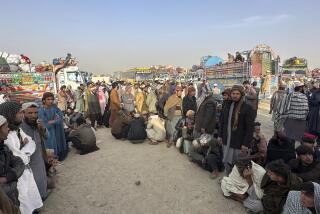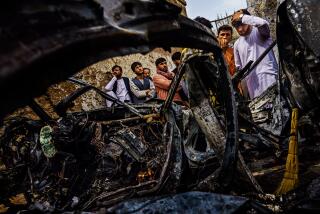A sea of Pakistani civilians flees area of Taliban-army fighting
- Share via
MARDAN, PAKISTAN — Laborer Amir Zada kicked the flies off his sandals, looked around at the rows of tents and relived the nightmare he had just endured. How the Taliban came and said there would be peace. How the army arrived with helicopter gunships to attack the Taliban. And how the two sides started firing at each other, with civilians like him caught in the middle.
In desperation he, his wife and their seven children fled their home in Daggar, the main town in the Buner district, walking 20 miles before they reached the Sherkh Shehzad camp for displaced people in Mardan, in northwestern Pakistan.
“No one leaves their home easily,” Zada said. “Our kids are terrified. I don’t have any idea when we’ll be able to go back.”
Zada and his family are among the torrent of people streaming out of the conflict-hit areas of Pakistan’s frontier provinces. On Tuesday, a North-West Frontier Province official said local authorities were bracing for the possibility that hundreds of thousands of displaced people would arrive in the coming weeks.
With some analysts expecting the army to launch an offensive against militants in the Swat Valley in the next few days, there was little indication that the human tide would ebb any time soon. Buses leaving Mingora, Swat’s main town, were crammed Tuesday with people trying to get out.
Pakistani President Asif Ali Zardari is to meet with President Obama today in Washington, and the two are expected to discuss the operation against the Taliban in and around Swat.
Meanwhile, the fighting continued, prompting some to question why one of the world’s largest armies couldn’t quickly dispense with what has been estimated at a few thousand Taliban fighters, many of them poorly trained, some wearing flip-flops.
On Tuesday, militants occupied government offices, police stations and a military facility in the Malakand division, an area of recent heavy fighting that includes Swat and the Buner and Dir districts.
The seeds of the current crisis were sown in February, when local officials signed a controversial peace deal allowing the militants to impose Sharia, or Islamic law, in Swat in return for laying down their weapons. The Taliban, however, sought to expand its strict interpretation of Islam to neighboring districts, prompting the army to take action.
Many analysts say the peace deal is all but dead, with both sides trading charges over who has acted in bad faith. Iftikhar Hussain, information minister for North-West Frontier Province, told reporters in Peshawar on Tuesday that militants should lay down their arms in Swat or risk having the army move in to restore government authority.
“Militants have two options: surrender or face action,” he said.
Adding to the flight of civilians, the government in Swat extended a curfew Tuesday and encouraged people to leave, leading many frightened residents to assume that an army attack was imminent. Though officials reversed course later in the day and told people to stay, thousands more were already on the move.
The Sherkh Shehzad camp held about 1,000 people Tuesday, but the numbers were in flux. Cleared land was ready to accommodate more tents provided by the United Nations.
“Totals vary hour to hour,” said Usman Khan, an official with the Saiban Development Organization, a Mardan-based civic group. “And many people who arrive don’t want to be here, so they turn around and leave.”
As Zada spoke, a worker troweled concrete around a newly built squat toilet, one of three under construction with “UNICEF” prominently labeling their fabric walls.
Zada said he worried about his children, who aren’t in school, and about the crops and animals they left behind to fend for themselves. He said he didn’t know whether the army or the Talban was right, he just wanted his life back.
“I don’t know what things will look like when we return,” he said. “God willing, it won’t be too long.”
--
Special correspondent Zulfiqar Ali in Peshawar contributed to this report.
More to Read
Sign up for Essential California
The most important California stories and recommendations in your inbox every morning.
You may occasionally receive promotional content from the Los Angeles Times.










